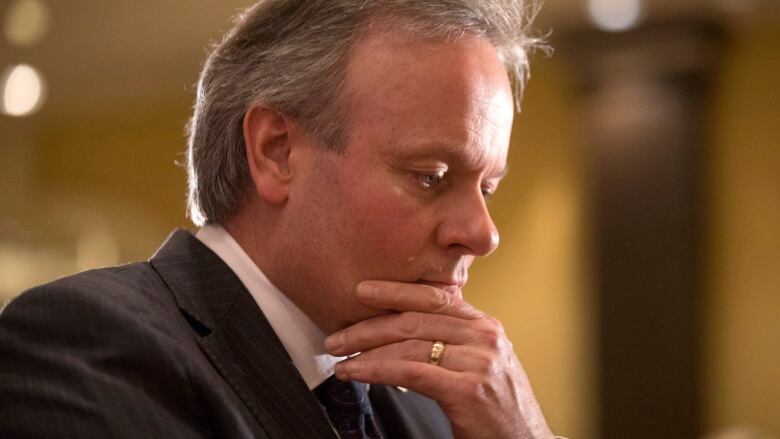Loonie wobbles as Bank of Canada cites trade fears in interest rate decision
Bank's statement cites trade policy concerns, housing slowdown in decision to leave key rate unchanged

The Bank of Canada did what was expected on Wednesday, opting not to change its benchmark interest rate from its current level of 1.25 per cent.
But in a statement, it seemed to hint at concern over growing trade protectionism in justifying the decision to not raise rates again this time around.
"Trade policy developments are an important and growing source of uncertainty for the global and Canadian outlooks," the bank said in an apparent reference to U.S. President Donald Trump's controversial willingness to raise tariffs to protect U.S. industries.
The decision to stand pat was exactly what was expected. But the cautiously negative tone of the accompanying statement sent the loonie lower, losing about half a cent after the decision came out to dip below 77 cents US. That's down by three cents in less than a month.
The loonie later gained back much of the day'slossesamid word from the White House that Canada and Mexico may get exemptions from pending U.S. tariffs on steel and aluminum.
The bank noted disappointing Canadian GDP numbers, which have showed the Canadian economy expanded at an annual pace of just 1.6 per cent in the last half of 2017 less than half the pace seen in the first half.
Earlier on Wednesday, Statistics Canada revealed that Canada posted a trade deficit of almost $2 billion for the month of January, as exports fell by almost five per cent.
"The data releases are on the bank's mind, including the weak merchandise trade data for January which is added to the list," said Arlene Kish, an economist withIHS Markit.
And the bank mentioned a slowdown in the housing market. In January, new rules aimed at tightening the mortgage market came into force. That seems to have pushed people to buy in late 2017, before the rules came in, because more recent sales figures for January and February were down sharply from levels seen last year.
It remains to be seen whether the slowdown will last, but it's already clear the central bank is paying attention to whatever changes are underway in the housing market.
"It will take some time to fully assess the impact of these[rules] on housing demand and prices," the bank said, adding that "the bank continues to monitor the economy's sensitivity to higher interest rates."
While the bank was widely expected to stay on the sidelines, Wednesday's statement was interesting for how it underlines just how cautious the bank is being about the economy.
"While largely devoid of surprises, this statement gives zero sense of urgency for further rate hikes, and seems to fit in with our view that the bank is on the sidelines until the second half of the year," Bank of Montreal economist Doug Porter said after the decision was announced.
"While we currently look for hikes in July and October, that's clearly dependent on how trade issues unfold in the months ahead."
1 in 3 chance of hike next month
Eight times a year, the central bank meets to discuss its benchmark interest rate, known as the target for the overnight rate, which is the rate that banks charge each other for overnight loans.
The central bank's rate filters into the economy because it tends to affect rates that borrowers and savers get from retail banks on things like mortgages and savings accounts.
The bank's next meeting is scheduled for April 18. Trading in investments known as overnight index swaps implies that traders think there is a 33 per cent chance of a rate hike at that meeting.
Kishthinks that's a little soon, based on the data, and she suspects thebank is going to thinklong and hard before acting. "They will play the waiting game,"Kishsaid. "A rate hike will probably take place in May or July at the earliest."












_(720p).jpg)


 OFFICIAL HD MUSIC VIDEO.jpg)
.jpg)



























































































